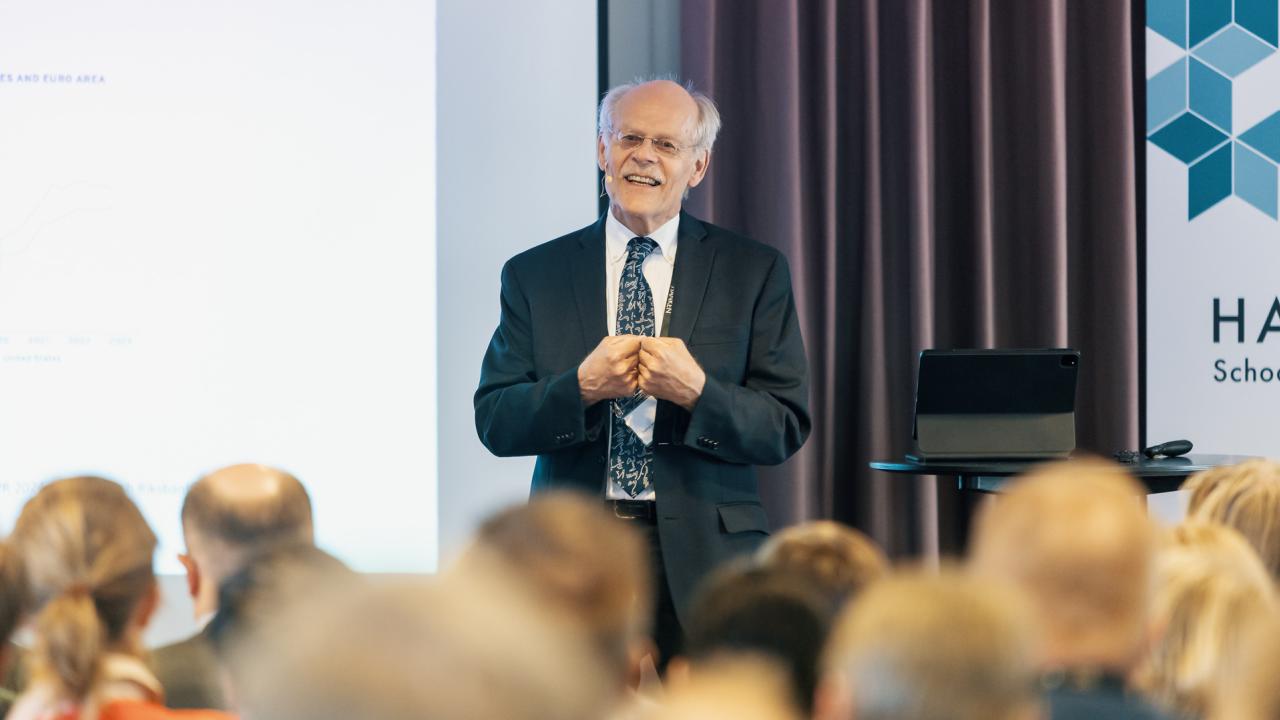Hankendagen 2024: "We have to almost run out of money before we do anything about the rising national debt"

Stefan Ingves spoke at Hankendagen, the largest annual alumni event at Hanken School of Economics, on 22 May 2024 in Vaasa. According to Ingves, we pay far too little attention to the growing public debt in many countries. Instead, we sit back and think that we will deal with the problem later.
“You're sitting in a barrel on the way to Niagara Falls, the sun is shining, and it's lovely. And the budget deficit is huge. Eventually you start to hear the roar from the falls but it's only when you're at the edge and the money runs out that something happens.”
Global increase in public debt
Today we see an increase in government debt throughout the world. Ingves points out that just over 20 years ago, industrialised countries had a public debt of around 77% of GDP and now it is already at 125%.
“When I was Deputy Governor at the Riksbank during the 1990s crisis, the debt burden in Sweden had risen to around 80 per cent. At that point we got a semi-secret visit from the International Monetary Fund. They had looked at the figures and said that this does not look good. You don't want the IMF to say that.”
According to Ingves, it was previously considered that if you have a debt ratio of somewhere around 50 per cent in developing countries, the economy crashes, but in the current situation, virtually all countries in the world have a national debt of over 50 per cent. We also have increasing financialisation, i.e. the size of the financial sector in relation to GDP in industrialised countries is much larger now than before.
“If you have a lot of financial assets and liabilities, you will almost certainly have a greater risk of financial instability. In small and open economies, there is also a risk of currency instability.”
Structural transformation more important than the choice of currency
In the Nordic countries, there are different variations of EU and euro membership: Finland is in both, Denmark is in the EU and has a fixed exchange rate against the euro, Sweden is in the EU but has a floating exchange rate, Norway is not in the EU and has a floating exchange rate. Yet all four countries have done well, according to Ingves.
“The exchange rate never saves you from a lack of structural transformation. You can have some benefit from a floating exchange rate in the short term, but probably not much more than that.”
According to Ingves, the most important thing in the end is structural transformation. One example of a necessary structural change in Finland is the need to reform the Finnish wage model. Ingves argues that every now and then, some part of Finnish business life is almost eliminated by strikes, which will not hold in the long run.
How can future challenges be tackled?
Stefan Ingves gives some examples of how to prepare against future economic challenges. He suggests raising the retirement age and increasing immigration to support the aging population. We should also invest in education and build human capital.
“We need monetary stability with an inflation rate of no more than two per cent, fiscal stability in the form of a manageable national debt, a functioning legal system and good education. If we manage to do all that, we will probably be alright this time, too!”, Ingves summarised.
The seminar ended with announcing the Alumni of the Year 2024, Kaj Rönnlund. Read more about him here: Alum of the Year 2024
Link to the image gallery from the event: Hankendagen 22.05 | Flickr
Link to the recording
Text: Marlene Günsberg
Photo: Christoffer Björklund

